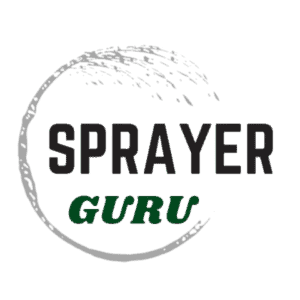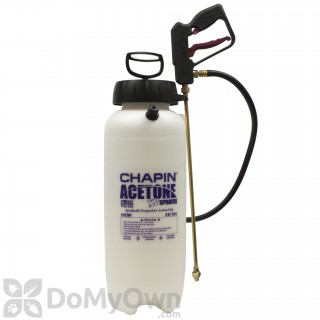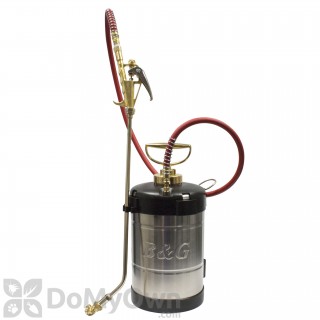A hand pump sprayer is a versatile tool for many different applications. They are simple to use and can be adapted to spray almost anything. They are commonly used for pest control, lawn care, stains, and sealers.
There are several different design types. They differ in size, the materials used to construct them, and how durable they are. Let’s take a closer look at the differences between the hand pump sprayers available and what type of hand pump sprayer you should use.
What is a Hand Pump Up Sprayer?
Hand pump sprayers or “pump-up” sprayers are simple sprayers. They consist of a tank, pump assembly, hose, and spray wand. They are operated by pumping the handle to force air inside the tank. This builds up the pressure so that when you pull your trigger on the spray wand it forces liquid out of the nozzle.
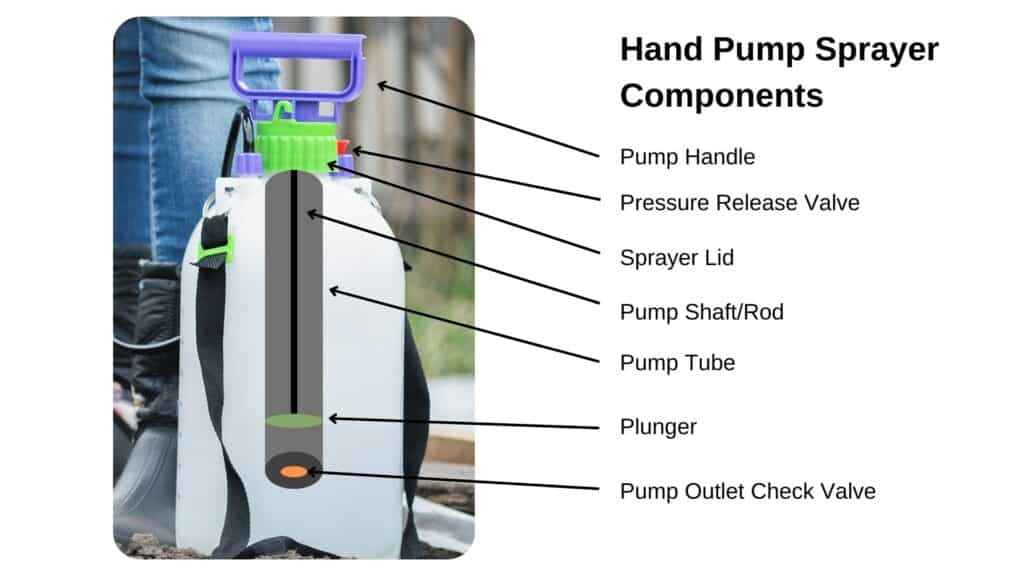
Read More: This Is How Hand Pump Sprayers Work
When Should You Use a Hand Pump Sprayer?
Hand sprayers can be used in countless scenarios. They will work with many different types of chemicals, cleaning products, fertilizers, pesticides, etc. Just be sure to choose one that is constructed to handle the specific liquid you plan to use (more on this shortly).
Here is a list of the common applications for hand pump sprayers:
- Residential or commercial pesticide application
- Treating lawns and gardens with fungicides, herbicides, and fertilizers.
- Carpet care products.
- Concrete sealer for driveways.
- Applying disinfectants indoors.
- Dust control in small areas.
- Auto detail products.
What are The Different Types of Hand Sprayers?
- Plastic: Most hand pump sprayers you will find at a farm or hardware store will be made from polyethylene. This is a type of plastic that is durable and has an extremely wide range range of chemical compatibility. Often the tank and pump assembly will be made all from poly or nylon, but plastic sprayers will have a pump assembly made of a combination of plastic and metal parts.
- Metal: Metal tanks are generally more durable than poly tanks. They are usually used in commercial pest applicators and other industrial applications.
- Handheld: Small-capacity pump sprayers that are made to be used with one hand.
- Economy: Low-cost sprayers. Tanks are made from thinner wall plastic. These sprayers are generally not made to last for long or be repaired.
Critical Factors to Consider When Selecting a Hand Sprayer
There is more to selecting the right sprayer than knowing how they work. Different applications will put different demands on a hand sprayer. This is why there are so many different types available. To narrow down all the available options, you need to ask the right questions.
Here are the critical things to consider before you buy a hand pump sprayer:
What Material Is Best for Your Application?
The tanks, o-rings, and hoses on your sprayer need to be compatible with the liquid you are spraying. Poly tanks and rubber or vinyl hoses are common because they have a pretty wide range of chemical compatibility.
For most lawn or pest control products, the “standard” sprayers found at your local hardware store will work fine. Especially considering you will likely dilute the liquid and your final solution is mostly water.
However, there are specific types of liquid that are only compatible with certain seal types. Even when the box says “chemical resistant” it does not cover all chemicals or liquids. It is important to check the actual materials being used as seals, o-rings, etc.
I checked with several hand sprayer manufacturers for guidance and recommendations on material compatibility. Here is what I found, keep in mind that these may not cover all scenarios and are general guidelines based on experience and testing.
- Solvent-Based Concrete Sealers: Buna or Viton gaskets, o-rings, and seals. Polyethylene tanks, nylon, or PVC hoses. Nylon and aluminum for spray wands.
- Acetone: EPDM seals, gaskets. Poly tanks. Nylon, brass, or polypropylene wands and spray guns. DO NOT use Viton or PVC for acetone.
- Herbicides: Viton or EPDM gaskets, o-rings, and seals. Poly tanks, EPDM rubber hose, nylon hose. Polypropylene, stainless, and nylon wands, or spray guns.
- Nitrogen Fertilizers: Viton gaskets, o-rings, and seals. Poly tanks, EPDM rubber hose. Polypropylene or stainless steel for spray wands and sprayer guns.
- Insecticides: Viton gaskets and seals. Polyethylene tanks. Poly and brass work for spray wands, spray guns, and spray tips.
- Fungicides: Viton gaskets and seals. Polyethylene tanks. Poly or brass for spray wands and spray guns.
What Size Sprayer Do You Need?
Sprayer capacity should be balanced with your ability or desire to carry around a fully loaded sprayer. The common sizes for hand sprayers range from 1-3 gallons. A fully loaded 3-gallon sprayer can weigh about 25 pounds or more.
If your job only requires 1 or 2 gallons of liquid to complete, then there is no need for the extra cost and weight of the larger 3-gallon sprayers. However, if you find that refilling your sprayer is more of a hassle than carrying the extra weight of a 3 -gallon sprayer then the extra cost may be worth it.
How Far Will the Sprayer Reach?
Sprayer reach or spray distance is an important aspect of a hand pump sprayer. Many jobs, specifically cleaning jobs, require that you can hit targets 10, 15, and 20 ft away or further. But figuring out what sprayer will spray the farthest can be a bit tricky. There are a lot of variables and factors that can affect spray distance.
Most hand pump sprayers are limited in the pressure they can produce. These sprayers work because air is forced into the tank. At a certain point, you can’t pump any more air into the tank without doing damage. The max pressure for most hand pump-up sprayers is 40-60 psi.
The other half of the equation is the nozzle size and type used on the sprayer. A sprayer with a fan nozzle or a cone nozzle will not spray as far as larger nozzles are designed for distance. Many sprayers come with a few nozzle options.
If your goal is distance with a hand pump sprayer, the nozzle is just as important as the sprayer. Look for a small volume nozzle that has a solid stream or an adjustable cone nozzle. I have used this nozzle and find that for the money it is hard to beat. It is versatile enough to work for about any task and it comes in brass or poly:
You can potentially add this spray nozzle to any hand pump sprayer. Check out this video for more information on adapting nozzles to different spray wands.
Read More: Testing How Far a Pump Sprayer Will Spray & What Type of Sprayer Can Spray Tall Trees?
Nozzle Size & Nozzle Type
This aspect of the sprayer continues from the previous section about spray distance. You want to choose a sprayer with nozzle size and type that fits your application. Again, most of the sprayers on the market will come with a few different nozzle types, but you may need to purchase a nozzle outside of what is included with the sprayer.
Nozzle Types
Here is a list of different nozzle types and their uses:
- Fan Nozzle: the preferred nozzle type for pressure washing and coating surfaces. Also used on spray booms.
- Cone Nozzle: Perfect for spot-spraying herbicides.
- Solid Stream Nozzle: Use for distance and for penetrating.
- Flood Nozzle: Wide coverage pattern with large droplets. Perfect for turf use.
- Adjustable Nozzle: My preferred choice for spraying lawns/turf. Adjusts from a cone nozzle for good coverage to a solid stream or distance (examples shown above).
Read More: Is There a Standard Spray Nozzle?
Nozzle Size
Nozzle size or nozzle capacity refers to the amount of liquid that will come out of the nozzle at a given psi. Typically sprayer nozzle capacities are rated at 40 psi. Depending on your spray task, you may need a larger or smaller nozzle.
Most hand sprayer applications will not require high-flow nozzles. Since the sprayer only works so long as you keep pressure in the tank, a large nozzle will mean more pumping to keep your sprayer working. Generally, nozzles used with hand pump sprayers are between 0.1-0.3 gallons per minute.
You can figure out approximately what size nozzle you should use by calibrating your sprayer. This is the process of determining how much liquid you need your sprayer to spray per minute based on your walking speed, how you spray, and the application rate of the product you are using. For more information check out the short guide I wrote on how to calibrate your sprayer for beginners.
Budget
One more aspect to consider, but it is important. If money is not a concern, then I definitely recommend investing in a quality hand sprayer. There are models available with tanks and wands made from all stainless and brass with high-quality seals. These sprayers are more durable than your poly tank sprayers. If you want to do commercial work or will spray often, then these are the choice for you.
For most of us, we can’t dump $400 into a hand pump sprayer. There are still quality options out there for much less but keep in mind, any time you spray chemicals, fertilizers, etc., your equipment is eventually going to suffer wear and tear.
Some sprayers will offer extra features: padded straps, locking triggers, wide-open tops, tip-proof bases, longer wands, etc. In my experience, these features can be nice if they apply to your application, but the quality of the sprayer itself isn’t necessarily better than the models without these upgrades. If you are looking to save money, you can go for a more basic sprayer.
Common Pump Sprayer Issues
Two of the main issues that arise with hand sprayers are leaking and plugging. Even if you invest money into a heavy-duty industrial sprayer, these issues can occur. If you choose to invest in a more expensive sprayer it is imperative that you maintain your sprayer.
For best results, don’t store chemicals or liquid products you use in the sprayer. After each use flush the sprayer completely. this requires filling the tank about 1/3 full of fresh water and pumping it through the hose, wand, and nozzle until empty.
If you are going to change chemicals or you use a harsh product, you can use a tank cleaner to flush the sprayer before storing it for long periods of time. Blazer tank cleaner is pink, so you have a visual indication when all the cleaner is flushed from the sprayer.
These methods will help prevent leaks and the residue build-up that creates plugs.
Read More:
How to Keep Nozzles From Dripping
Hand Pump Sprayer Suggestions
If you are looking for a quality hand pump sprayer refer to this list of sprayers that will work with specific applications:
Hand Sprayer for Weed Killer
Solo 456 2.25 Gallon Professional Handheld Sprayer

Features: Viton seals. A sturdy base that keeps it from tipping. The wand will work with many different spray tips.
*I have personally used this sprayer for years with no issues. It is a great sprayer for the cost. The only change I would make is to add a longer hose.
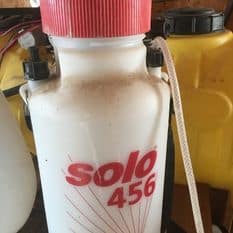
Hand Pump Sprayers for Concrete Sealer
Features: Steel tank with corrosion-resistant coating. Used for concrete sealers. *Not for use with acetones.
Acetone Hand Pump Sprayer
Features: EPDM seals for acetone. Heavy-duty brass wand with dripless shut-off.
Hand Pump Sprayers for Bleach
Smith Performance - 2 Gallon Bleach Sprayer

Features: Viton seals. Stainless steel wand. Easy to replace pump seals.
Best Value Hand Sprayer
SOLO 430-2G Handheld Sprayer Farm & Landscape, 2-Gallon

Features: Easy fill opening, storage compartment in the lid. Comes with 4 nozzles.
Best Hand Pump Sprayer for Commercial Pest Control
Features: Leak tested. No drip spray tip included. Stainless steel tank. 1-Year Warranty.
Bottom Line
When choosing a hand pump sprayer you want one that will be compatible with the type of chemical/fluid that you will be using. You also want to select a quality sprayer that still fits your budget. If you will use a hand sprayer for business or commercial use, then it is worth the money to invest in a heavy-duty sprayer.
Whatever type of sprayer you select, without proper maintenance and care you will run into issues with leaking, plugging, or corrosion.
